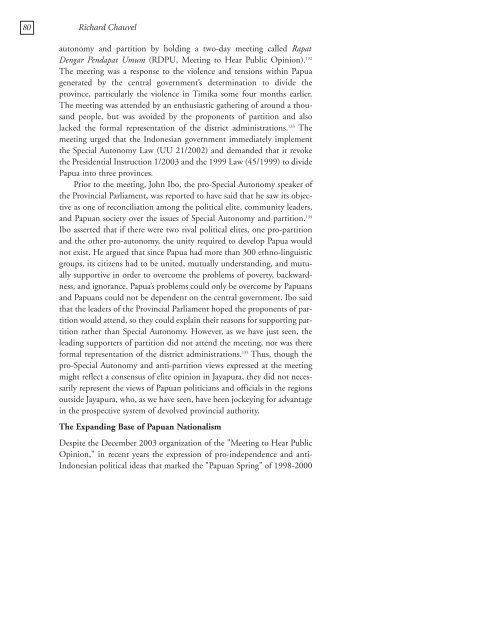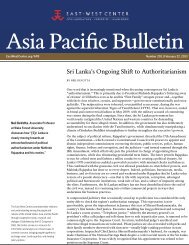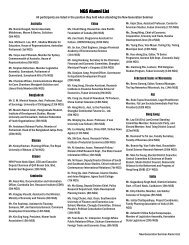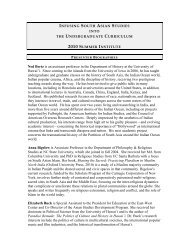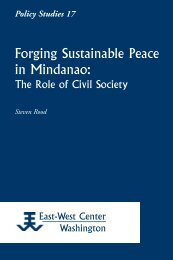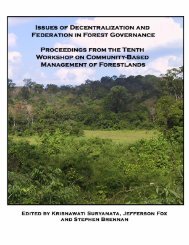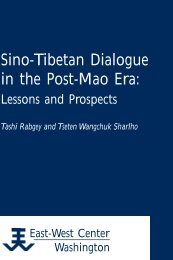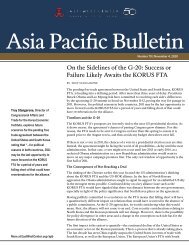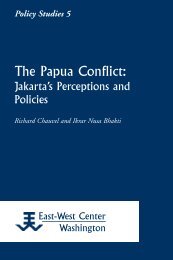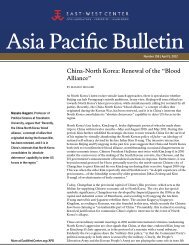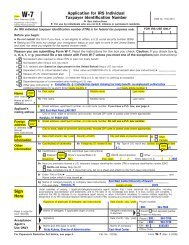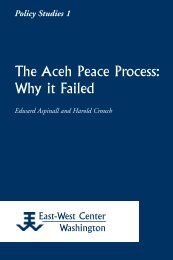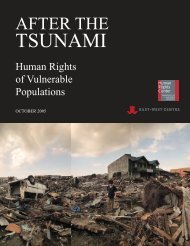Constructing Papuan Nationalism: History, Ethnicity ... - ScholarSpace
Constructing Papuan Nationalism: History, Ethnicity ... - ScholarSpace
Constructing Papuan Nationalism: History, Ethnicity ... - ScholarSpace
- No tags were found...
You also want an ePaper? Increase the reach of your titles
YUMPU automatically turns print PDFs into web optimized ePapers that Google loves.
80 Richard Chauvelautonomy and partition by holding a two-day meeting called RapatDengar Pendapat Umum (RDPU, Meeting to Hear Public Opinion). 132The meeting was a response to the violence and tensions within Papuagenerated by the central government’s determination to divide theprovince, particularly the violence in Timika some four months earlier.The meeting was attended by an enthusiastic gathering of around a thousandpeople, but was avoided by the proponents of partition and alsolacked the formal representation of the district administrations. 133 Themeeting urged that the Indonesian government immediately implementthe Special Autonomy Law (UU 21/2002) and demanded that it revokethe Presidential Instruction 1/2003 and the 1999 Law (45/1999) to dividePapua into three provinces.Prior to the meeting, John Ibo, the pro-Special Autonomy speaker ofthe Provincial Parliament, was reported to have said that he saw its objectiveas one of reconciliation among the political elite, community leaders,and <strong>Papuan</strong> society over the issues of Special Autonomy and partition. 134Ibo asserted that if there were two rival political elites, one pro-partitionand the other pro-autonomy, the unity required to develop Papua wouldnot exist. He argued that since Papua had more than 300 ethno-linguisticgroups, its citizens had to be united, mutually understanding, and mutuallysupportive in order to overcome the problems of poverty, backwardness,and ignorance. Papua’s problems could only be overcome by <strong>Papuan</strong>sand <strong>Papuan</strong>s could not be dependent on the central government. Ibo saidthat the leaders of the Provincial Parliament hoped the proponents of partitionwould attend, so they could explain their reasons for supporting partitionrather than Special Autonomy. However, as we have just seen, theleading supporters of partition did not attend the meeting, nor was thereformal representation of the district administrations. 135 Thus, though thepro-Special Autonomy and anti-partition views expressed at the meetingmight reflect a consensus of elite opinion in Jayapura, they did not necessarilyrepresent the views of <strong>Papuan</strong> politicians and officials in the regionsoutside Jayapura, who, as we have seen, have been jockeying for advantagein the prospective system of devolved provincial authority.The Expanding Base of <strong>Papuan</strong> <strong>Nationalism</strong>Despite the December 2003 organization of the "Meeting to Hear PublicOpinion," in recent years the expression of pro-independence and anti-Indonesian political ideas that marked the "<strong>Papuan</strong> Spring" of 1998-2000


